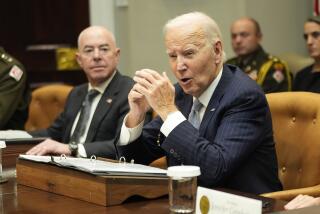U.S. Firms Given Temporary OK to Continue in Libya
- Share via
WASHINGTON — About a dozen American firms are being permitted to continue their operations in Libya under special temporary licenses granted by the U.S. Treasury Department, despite President Reagan’s order in January banning American business activities in Libya, officials said last week.
The key exemptions have gone to five oil or petrochemical companies--including Los Angeles-based Occidental Petroleum Corp.--to keep Libyan strongman Moammar Kadafi from realizing “a possible $1-billion windfall” if the firms had to sell their assets hurriedly, Richard W. Murphy, assistant secretary of state for Near Eastern and South Asian affairs, told a House subcommittee hearing last week.
“It is simply a more complex road for them (the oil companies) to comply than it would be for someone selling a product from the States to Libya,” Murphy said. “Those five have clearly the most complex case of how to get out of doing business. They have had contracts which in a couple of cases extend to the year 2010 or 2019.”
A Treasury Department official said the other firms with exemptions largely provide oil-related services. If all the companies had been forced to dispose of their Libyan assets, plants and equipment by Reagan’s Feb. 1 deadline, he said, it would have been to the economic benefit of Kadafi, contrary to the purpose of the President’s order.
“We don’t want a fire sale (of any U.S. assets) or any windfall for Kadafi,” said the official, who declined to allow the use of his name.
Besides Occidental, the other major firms are W.R. Grace, Conoco-Dupont, Marathon-U.S. Steel and Amerada Hess, officials said. All must file periodic reports with the Treasury Department on the progress they are making toward closing down their operations and disposing of their holdings in Libya.
Use of Libyan Nationals
Occidental spokesman Jan Cohen said that her company has had no American employees in Libya since 1981, relying instead on Libyan nationals and those of other countries. Reagan’s order forbids all Americans to live in that country but allows exceptions for journalists and, on humanitarian grounds, for certain U.S. citizens married to Libyans. Diplomats in Libya estimate that there are still between 1,000 and 1,500 Americans there.
Cohen said Occidental’s reports on file with the Securities & Exchange Commission show that net crude and natural gas production from the company’s two Libyan concessions was only 49,000 barrels a day last year, down from 62,000 barrels a day in 1984.
The Treasury official said all U.S. firms still in Libya “have assured us they no longer have Americans employed there and that they are shutting down their operations as soon as practical.” In addition, any profits that they have realized since Feb. 1 must be placed in an escrow account, he said.
Rep. David R. Obey (D-Wis.), chairman of the House Appropriations subcommittee on foreign operations, told Murphy that as long as U.S. companies remain in Libya, they are contributing to Kadafi’s revenue base.
But Murphy said the alternative would be worse--a sudden sale of valuable assets and termination of multiyear contracts. He said corporate activities “are being brought to an end as soon as possible.”
More to Read
Sign up for Essential California
The most important California stories and recommendations in your inbox every morning.
You may occasionally receive promotional content from the Los Angeles Times.













